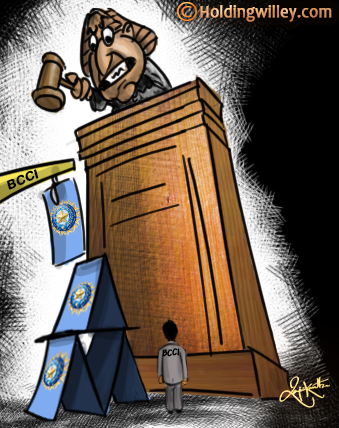 After being elected BCCI President unopposed on Sunday (4th October) following Jagmohan Dalmiya’s death, Shashank Manohar said a lot of commendable things in the first press conference of his second term. Manohar spoke openly and candidly, perhaps unprecedentedly for a BCCI President, of the urgent need to tackle conflict of interest, corruption and inefficiency, and the importance of transparency in repairing the public’s faith in the board and the sport.
After being elected BCCI President unopposed on Sunday (4th October) following Jagmohan Dalmiya’s death, Shashank Manohar said a lot of commendable things in the first press conference of his second term. Manohar spoke openly and candidly, perhaps unprecedentedly for a BCCI President, of the urgent need to tackle conflict of interest, corruption and inefficiency, and the importance of transparency in repairing the public’s faith in the board and the sport.
What Manohar proposed is, of course, still a long way from the kind of independent and accountable governance suggested by the likes of Lord Woolf, but it was, from an admittedly low starting point, an impressive and encouraging press conference.
“
But it was, alas, only a press conference. That is not to say that what he stated is not deserving of praise; it is. But there is a big difference between saying something and actually doing it - especially within the complex and chaotic BCCI. Indeed, it is not necessarily that Manohar should not be trusted; it is that the BCCI should not be trusted. In Indian cricket, seeing is believing. This is a good start in a poorly run board, but it’s only a start, and it is still a poorly run board.
”
Things will likely only get tougher for Manohar from here. Although he was elected unopposed, the uncontested election belies a board more fragmented than united. Only this week, Narayanswami Srinivasan, who tried and failed to broker a deal with Sharad Pawar to contest the election, filed a petition seeking prosecution of BCCI Secretary and Indian cricket’s coming man, Anurag Thakur, which was supported by an affidavit from BCCI treasurer Anirudh Chaudhry.
Although Manohar claimed at his press conference to have talked the two factions down, informally at least, the Srinivasan-Thakur/Sharad Pawar divide will not go away so easily. It will be difficult for Manohar to tackle the numerous challenges facing him while his board is warring beneath him.
Of course, the more pertinent challenge facing Manohar will come externally, from the Lodha Committee’s imminent report, which will recommend structural changes to the BCCI. Last week, IPL Chairman Rajeev Shukla was honest and brazen enough to admit that the BCCI will “wait for the report to come out” before agreeing to its recommendations being binding. Although if the Committee are as firm as they were with regards to Chennai Super Kings and Rajasthan Royals, the BCCI may not have a choice.
Indeed, as much as Manohar’s sentiments were encouraging, it is yet again impossible to separate the board’s concerted PR push—Manohar insisted theirs was a perception issue not a functionality issue—from the looming Lodha report. Not for the first time, the BCCI are being reactive, not proactive and that will not and cannot escape the Lodha Committee’s attention.
Perhaps Manohar’s attempts at reform were exposed somewhat at the end of the press conference. “I would also need your support.” Manohar said to the media. “It is you,” pointing at the assembled press, “who build our image before the general public at large. It is not only the duty of the board, but also the media, which is another limb, to show that this game is clean, transparent and restore the faith of cricket loving fans in this country. ”
No it is not, Mr. Manohar. It is you, the BCCI, who build your own image. Turn that finger on your own board, turn those words into actions and you’ll eventually see a change in the media’s approach.